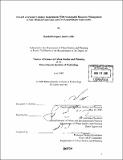Toward a greener campus : experiments with sustainable resource management at one Mexican university and two United States universities
Author(s)
Coffie, Randall Gregory Jesus
DownloadFull printable version (15.97Mb)
Other Contributors
Massachusetts Institute of Technology. Dept. of Urban Studies and Planning.
Advisor
Lawrence Susskind.
Terms of use
Metadata
Show full item recordAbstract
Modern society faces a range of difficult resource management problem like climate change, acid rain and soil depletion. To confront problems like these successfully, educational institutions, along with all other public and private entities, must do their part. Universities, in particular, need to reflect on whether they are managing their campus environments in a sustainable fashion, since the professionals they seek to train will be influenced as much by the everyday practice of campus management as by what they are taught in the classroom. The main objective of this study is to generate proposals for the implementation of a sustainable resource management program at the Guadalajara campus of the "Instituto Tecnologico de Estudios Superiores de Monterrey" system (ITESM) in Mexico. ITESM is well known as an innovative institution. Its thirty-two-campus system made a commitment to greater sustainability in 2004. Subsequently, while efforts have been made to transform resource management practices at ITESM, there is still a lot to be learned before a truly sustainable resource management program can be put in place. To help generate ideas for ITESM, an analysis of efforts to promote sustainability at two prestigious American universities -- MIT and Harvard - has been generated. Both campuses have had to confront, and are still confronting, obstacles of various kinds including confusion about what is and is not sustainable, resistance to change, and concern that investments in sustainability are not recoverably. Harvard has designed an integrated approach to all the "green initiatives" on its campus (i.e. the Harvard Green Campus Initiative). MIT has pursued a series of independent and opportunistic projects. (cont.) Practical ideas that would complement efforts already underway on the Guadalajara campus can be drawn from both American campuses. What is essential to effective sustainable resource management at any university, regardless of its size, financial power or prestige, is the commitment of its core staff and administration to continuous quality improvement. This must be undertaken in collaboration with all stakeholders on the campus and involve extensive outreach that facilitates widespread involvement and public learning. Other important preconditions for sustainable resource management are a comprehensive audit that can help to benchmark existing conditions and careful consistent monitoring.
Description
Thesis (S.M.)--Massachusetts Institute of Technology, Dept. of Urban Studies and Planning, 2005. Includes bibliographical references (leaves 141-142).
Date issued
2005Department
Massachusetts Institute of Technology. Department of Urban Studies and PlanningPublisher
Massachusetts Institute of Technology
Keywords
Urban Studies and Planning.